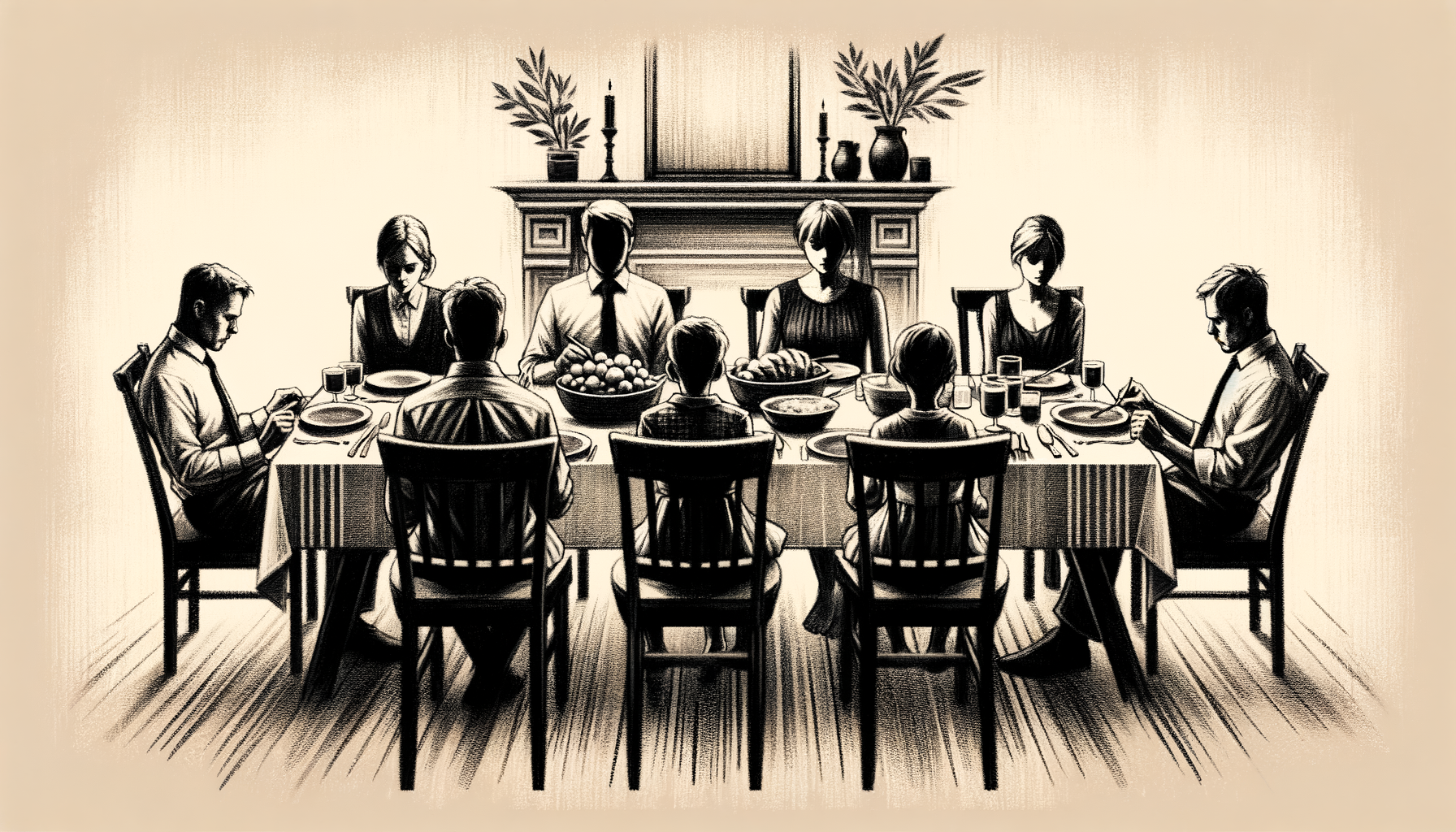Byline: A tale of family lore, traditions, and those unforgettable characters who make life weirdly beautiful.
The Opening Scene: When Dinner Became a Theatrical Production
Growing up in Toronto’s Riverdale neighborhood, the dinner table in my family was never just about food. It was a stage, a battlefield, and occasionally, a comedy club, where every personality had its moment to shine—or clash, depending on the night. My dad, ever the tech visionary, would rhapsodize over the next big innovation in AI (years before ChatGPT made it cool), while my mom orchestrated conversations with the finesse of someone who probably regretted marrying a man who gave PowerPoint presentations as holiday gifts.
But the true stars were my grandparents. My grandmother, a sprightly Irishwoman with the uncanny ability to turn any anecdote into an epic drama, once spent 20 minutes detailing her harrowing escape from a low-battery smoke alarm. My grandfather, her quiet Greek counterpart, played the role of the reluctant straight man, muttering witty one-liners under his breath that somehow stole the scene. “She’s right,” he once deadpanned, glancing at the ceiling during one of her long-winded tales. “That alarm practically begged her to run.”
This was my formative education in storytelling. Somewhere between the Greek myths my grandfather shared and my grandmother’s over-the-top renditions of ordinary Sunday afternoons, I learned two things: that stories have power, and it’s always more fun if you add a touch of embellishment. Little did I know how these family theatrics would shape not only my worldview but also my clumsy first forays into dating.
Lesson No. 1: Take Time to Look Past the Headlines
You know that old saying, “Don’t judge a book by its cover”? My grandmother was living proof of why you shouldn’t—but for entirely unexpected reasons. On the surface, she was all Irish charm and quaint aphorisms. But dig a little deeper, and you’d find someone who kept an undertone of no-nonsense realism beneath her warmth. “The key to understanding anyone,” she told me once, standing in front of an oven roasting a chicken, “is finding out why they’re off in the first place. No one’s normal, Daniel, so stop looking for people who are.”
This advice came rushing back to me years later, during a first date I convinced myself wasn’t going well. The woman across from me—let’s call her Lisa—had opened by declaring she didn’t “get movies” and found books “frustratingly non-interactive.” My immediate reaction, honed through years of film and literary obsession, was to internally prepare the “It’s still nice to meet you” handshake. But my grandmother’s words held the reins.
So I stayed curious. I asked Lisa about her favorite ways to learn new things and discovered she was an incredible painter with an intuitive grasp of visual storytelling. It wasn’t a love match, but it was an honest validation of my grandmother’s long-standing truth: people rarely match their headline, and their substance often needs patience to emerge.
Lesson No. 2: Embrace Chaos, It Makes Things Memorable
Some families pass down recipes. Mine? We passed down the ability to create chaos in the most predictable scenarios. Take, for instance, our family tradition of baking. Every December, my mom and I would attempt the annual “holiday cookies” session, but my dad inevitably turned it into a science experiment involving electric scales and temperature-controlled butter. My grandmother offered inappropriate commentary from the sidelines (“Isn’t it easier to just buy cookies? These look like test subjects.”) while my grandfather maintained a running total of wasted flour.
Here’s the truth: no batch ever turned out Instagram-worthy. But those messy baking sessions taught me a surprisingly romantic life lesson. Connection isn’t created in pristine, picture-perfect moments. It’s born in the spills, the burns, the arguments over whether parchment paper is necessary (it is, by the way). Relationships—whether familial or romantic—aren’t about curated perfection. They’re about embracing the chaos and laughing when the sugar lands all over the floor.
This perspective once saved me during a comically disastrous cooking date. I accidentally switched the salt for the sugar in the brownie batter (pro tip: triple-check your labels), and the result tasted like heartbreak. But instead of spiraling into self-loathing, I owned the disaster. That night ended in shared laughter over bad brownies and, later, an attempt at redemption pancakes.
Lesson No. 3: Always Leave Room for Outrageous Characters
The stories in my family would be incomplete without my Uncle Tony, my mom’s younger brother, who treated life as if it were a strategy game where charisma was his biggest skill point. Tony was the kind of guy who’d show up to a family barbecue in a three-piece suit and insist on “auditioning” as the grill master, despite a long history of setting off fire alarms. “You’re overthinking the charcoal,” he’d say, fanning flames with a laminated copy of GQ magazine.
Tony’s advice-laden theatrics often came out during family gatherings, but oddly enough, his most valuable insight has stuck with me through the years: “People remember how you made them feel, not just what you said.” Take it from the guy who gave my cousin a toast at her wedding that somehow turned into a heartfelt analysis of their shared hatred for Canadian geese. Whether you agreed with him or not, Tony left an impression.
In a world increasingly obsessed with filters—Instagram filters, emotional filters, dating filters—Tony taught me that standing out matters. When I’m nervous or unsure if I’m being “too much,” I channel a little Tony energy and remind myself it’s okay to make a splash. In dating or relationships, connecting often comes down to whether you’re willing to risk being memorable.
The Grand Takeaway: Your Stories Shape You (So Tell Them Well)
Family stories are more than heartwarming holiday fodder or overly dramatic retellings of mundane alarms. They’re mirrors reflecting who you are, lessons shaping who you’ll become, and reminders that connection—whether with your family, your date, or the person sitting next to you at a random workshop—is rooted in curiosity, chaos, and charm.
Whether it’s my grandmother redefining what “life advice” means through tales of smoke alarms, or my uncle proving charisma is an art form, my family offered me a blueprint for relationships in all their messy, gloriously imperfect forms. Connection is rarely neat, and the best stories—from flirtations over salt-and-sugar mishaps to deep conversations about books missed by their “non-interactive readers”—are never predictable.
So here’s my challenge for you: dig into your own family lore. Bring your quirks, lessons, and outrageous characters into your relationships, romantic or otherwise. It’s not about perfection—it’s about honesty, humor, and the stories that make you, well, you.
And if someone can’t appreciate those stories? Take my grandmother’s advice: they’re probably off. And that’s okay, too.




















